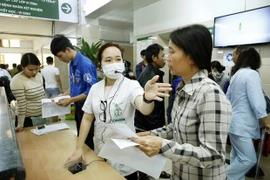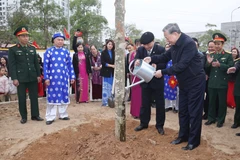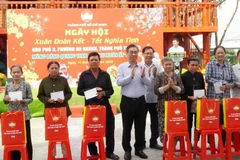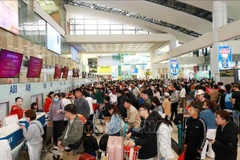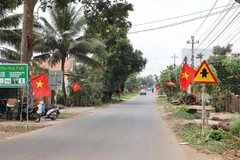The job offers opportunities for candidates to gain skills, high salaries andopportunities to stay, work and receive social benefits like native workers.
Tran Van Anh, head of Communication Desk at the Department of Overseas Labourunder the Ministry of Labour, Invalids and Social Affairs, said Vietnam hassent thousands of nurses to Taiwan, Japan and Germany.
According to the department, since 2012, about 1,200 candidates have joinedJapanese language courses run by the department and Japanese partners. Untilnow, 673 Vietnamese nurses have worked in Japan. The Ministry of Labour,Invalids and Social Affairs granted permission for 13 companies to send nursesto Japan.
According to the German Development Cooperation Agency (GIZ), under a pilotproject to attract workers from Vietnam to train as nurses in Germany, since2016, more than 300 trainee nurses and geriatric nurses from Vietnam foundemployment in Germany. A total 195 participants have completed their trainingand are now working in Germany as fully fledged nurses and geriatric nurses,while a further 125 are in training.
While Japan and Germany require nurse candidates to be professionally trainedin language and skills, Taiwanese employers usually consider nurses as domestichelpers who deal with household chores and take care of the elderly orchildren, Ha said.
Besides strict requirements, Japan and Germany usually offered assistance tocandidates, for example, up to 30-35 million VND per month for accommodationand food during a training course in the host countries, Ha said.
After the training courses, candidates take an exam to earn certificates whichhelped them get jobs with monthly salary of 50-60 million VND, Ha said, addingthat guest workers could then apply for residence status in the host countries.
“To get such benefits, Vietnamese workers must make efforts to meet the jobrequirements,” Ha said.
“Some Vietnamese nurses working in Japan and Germany said that what they didthere was different from the job descriptions. They said they worked more,” Ha said,warning that workers should not expect easy jobs with high salaries.
“When Vietnamese workers finish training courses in the host countries but havenot earned certificates to work as nurses, they have to do all the workassigned by official nurses. This means they might have to do more than thetasks was mentioned in their labour contracts,” Ha said.
Dang Sy Dung, deputy director of the Department of Overseas Labour, saidcandidates who wanted to become nurses should carefully learn about the job becauseof its complexity and difficulty.
“The job requires patience and hard work,” he said, adding that candidatesshould not merely look at the salary.
Dung said the department and the GIZ were implementing a programme to pick 230candidates to attend nurse training courses in Germany.
The candidates would take a 13-month German language course in Vietnam andthen, a 3-year course in Germany. During the training in Vietnam, they would beoffered accommodation, food and about 900,000 VND in cash monthly. Eachcandidate must pay 1.8 million VND monthly in training fees.
When in Germany, they would receive monthly salary of 27-34 million VND.
Nguyen Luong Trao, Chairman of the Vietnam Labour Export Association, saiddemand for nurses in Japan, Germany and other European countries was highbecause of their aging populations.
“Without co-operation and assistance from the governments of Vietnam and hostcountries for training, both workers and labour exporting companies find it astruggle to afford these programmes,” Trao said.
The number of Vietnamese workers sent to work abroad last year hit 140,000,increasing nearly 7 percent over 2017, according to the department. This wasthe fifth consecutive year the number has increased and exceeded100,000.-VNS/VNA



